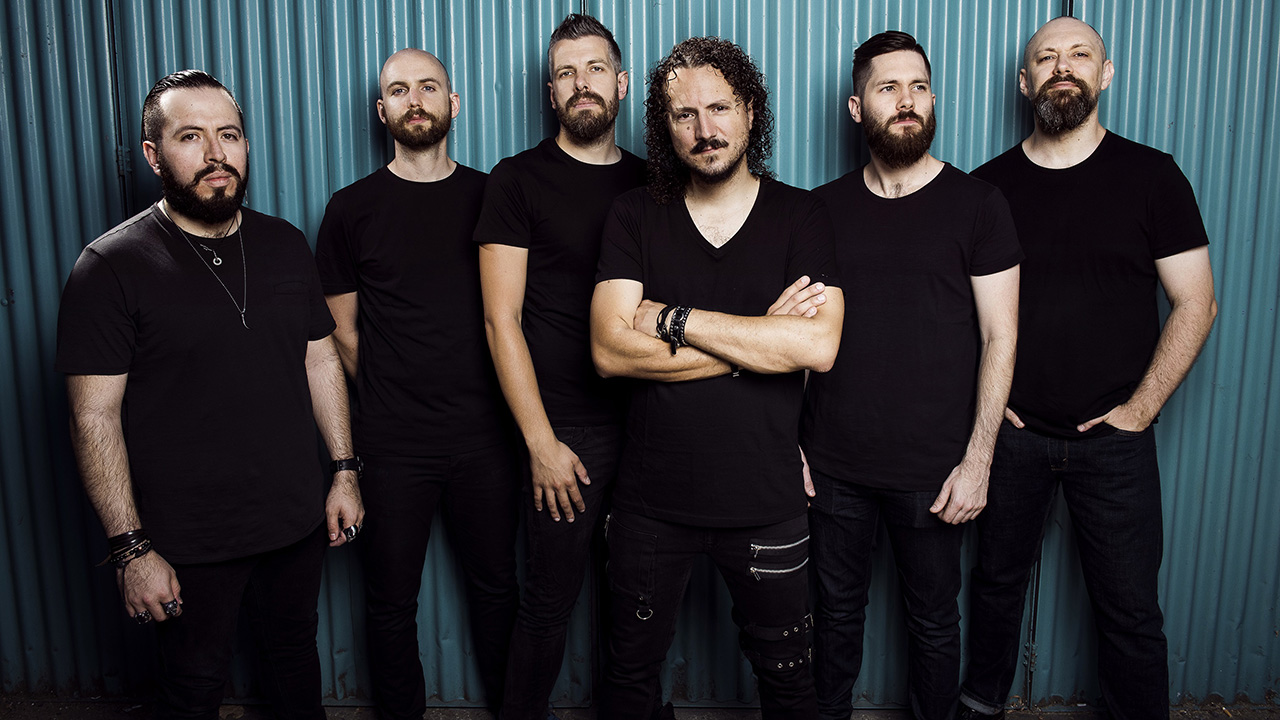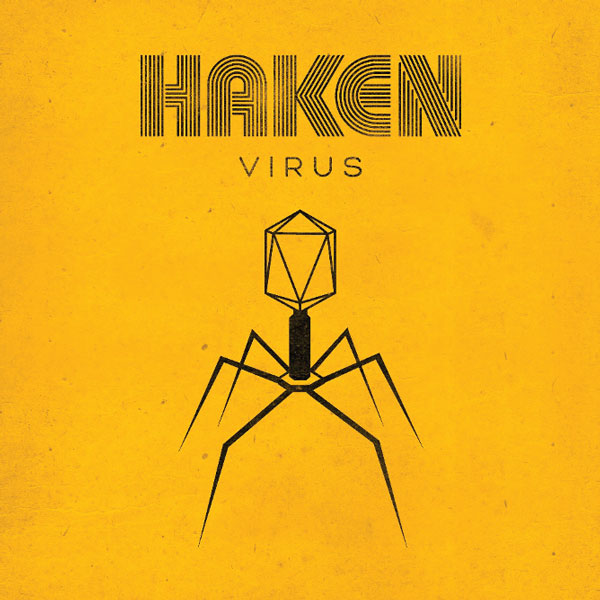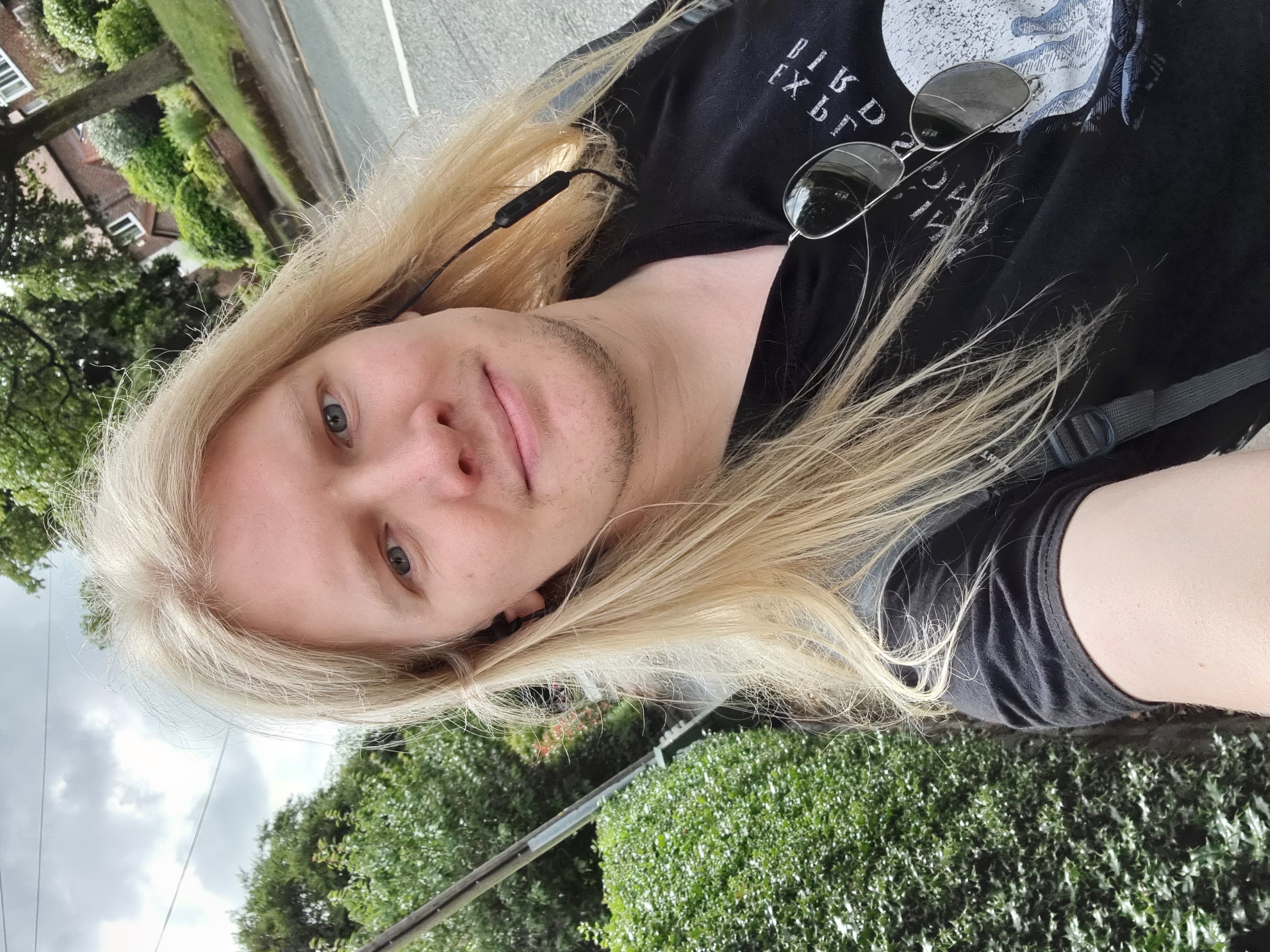"We never thought we would be releasing Virus during a pandemic!" Haken revisit the Cockroach King on their boldest album yet
The Cockroach King made them, now they’re breaking him. Prog catches up with Haken to learn all about their ambitious album, Virus, which concludes the prog metal titans’ definitive decade

Select the newsletters you’d like to receive. Then, add your email to sign up.
You are now subscribed
Your newsletter sign-up was successful
Want to add more newsletters?

Every Friday
Louder
Louder’s weekly newsletter is jam-packed with the team’s personal highlights from the last seven days, including features, breaking news, reviews and tons of juicy exclusives from the world of alternative music.

Every Friday
Classic Rock
The Classic Rock newsletter is an essential read for the discerning rock fan. Every week we bring you the news, reviews and the very best features and interviews from our extensive archive. Written by rock fans for rock fans.

Every Friday
Metal Hammer
For the last four decades Metal Hammer has been the world’s greatest metal magazine. Created by metalheads for metalheads, ‘Hammer takes you behind the scenes, closer to the action, and nearer to the bands that you love the most.

Every Friday
Prog
The Prog newsletter brings you the very best of Prog Magazine and our website, every Friday. We'll deliver you the very latest news from the Prog universe, informative features and archive material from Prog’s impressive vault.
Ambition has never been something that Haken have lacked. Ever since 2010’s Aquarius introduced the British progressive metal act to the world, they’ve striven for each new step to be bigger, bolder and braver than the last. Those self-perpetuating designs have put them at the pinnacle of the contemporary progressive metal scene, where they have remained for the last 10 years. Visions quickly followed in late 2011 and The Mountain, released two years later, married their technical virtuosity with raw, emotional lyrics, that showed a vulnerability making their complex music hugely relatable. It was the record that sent a fast-rising act skyrocketing. They haven’t let up since, producing two more critically acclaimed records in synth-loving Affinity and 2018’s forceful Vector. Now, as their first decade together draws to a close, the band are unleashing their most ambitiously grandiose statement yet.
Their sixth full-length release, Virus, marks the completion of an arcing narrative that first began to unravel seven years ago and one that has consumed the band, creatively, for the past three years. Staying true to Haken’s multicoloured plumage, the album pushes their versatile vitality further than ever before.
“Virus is a continuation of our last album, Vector,” reveals guitarist and chief songwriter Richard Henshall. “The narrative comes from one of the tracks on The Mountain called Cockroach King, which is a song that our fans seem to really like. We wanted to provide a back story to the protagonist we introduced in that. So, on Vector we see the character institutionalised, then, with Virus, the narrative follows his maniacal downfall.”
“The idea for Vector and Virus came about when we were touring The Shattered Fortress with Mike Portnoy back in 2017,” explains vocalist Ross Jennings. “It was something that was born from the album five beginning with a V and the album six being VI in Roman numerals. So it was a case of how we could play about with that and then it really snowballed from there. For want of a better explanation, this was just a way of amusing ourselves and giving us something to write about over the two albums. We needed an anchor and the Cockroach King as a character became that anchor.”
Yet the vocalist feels there isn’t a direct parallel to Dream Theater’s five-album-spanning Twelve Step Suite and their own plans for the two records. “I’ve never made that connection before, actually. Sometimes these things probably seep into our subconscious psyche, but it definitely wasn’t a conscious decision or source for inspiration for Virus.”
He’s keen to add that the two titles have remained unchanged since the nucleus of the concept was conceived three years ago: “We never thought we would be releasing Virus during a pandemic and we don’t want people to think we’re cashing in on it.”
When Vector was released back in October 2018, the band dropped no hints that the album was in fact one half of an audacious two-part album project that would represent the band’s greatest challenge to date. Their silence, they are now ready to divulge, was intended.
Sign up below to get the latest from Prog, plus exclusive special offers, direct to your inbox!
“We’ve kept the double album concept a secret until now because we wanted Vector to be treated in its own right and not solely as part of a pair,” Jennings returns. “But I am very dubious about calling it a double album. Even though Virus is part two to the story, it isn’t in a classic sense. It is very much its own album. We’re expanding the Haken universe lyrically and thematically from where we went with Vector, but I’m cautious of people thinking of it as just a continuation. You don’t need to have heard Vector to appreciate Virus. From the beginning, it was very important to us that Virus could stand on its own.
“Lyrically,” he continues, “we wanted to honour and celebrate Cockroach King because it was the song that gave us our big break. We became fascinated with exploring that character and who they might be. It was a self-indulgent but very
fun thing for us to do and we are really proud of what we’ve achieved with these albums, together and as individual releases.”
As the band began to map out the concept that spread across the two records, it soon became apparent that there was a sizeable scope to unite both Virus and Vector through its musical cues as well as its lyrical content. Says Henshall: “Because we had always planned for Virus to be part of a double album, while we were writing for Vector we were deliberately saving some ideas for Virus. We’d also call back to themes from Vector or Cockroach King and try to use them in new and interesting ways. For us, it was about looking at the bigger picture and trying to think of both albums and how they would play out when people were listening to them alongside one another.”
By breathing new life into recurrent themes, Virus plays out like an Easter egg hunt for diehards. With some of Cockroach King’s most outlandish moments so imaginatively revived for the album’s pièce de résistance, the emphatic five-part Messiah Complex, its scope now feels even larger. Sometimes those ideas come back
with a pomp and grandiosity; the Gentle Giant-inspired layered vocals that were such a crucial ingredient in the success of Cockroach King now ice a grinding djent riff, while other reprises are more subtle, buried deep within its sprawling arrangement. Some are noticeable upon first listen, others take many more to be discovered and that’s half of the joy of it. Expanding upon one of their signature tracks in such a fashion is dizzying in its ambition, delightful in its execution and compelling in its construction. The five-part track illustratively embodies the band’s instincts to always push and propel themselves forwards. It’s a move that’s typical of Haken and it conspires to ignite what is arguably their most accomplished record to date, even in the shadow of The Mountain and everything it helped them to achieve. That’s because, on Virus, the very essence that made that record so impressive has smartly been rekindled and the heat of the flames that burn through each and every track.
“We did speculate whether it was a good idea or not to be so explicit with some of the references in Messiah Complex,” says a thoughtful Jennings, “but as these two albums have been about exploring the Cockroach King in more detail we wanted to celebrate that with a grand opus to wrap everything up. It’s the song that goes into the most detail as to who the Cockroach King is. Lyrically it explores the ideology of a tyrannical government, the narcissism that surrounds it and seeing the rise and
fall of the Cockroach King as a political virus. It’s a fictional tale but there’s also an element of putting a mirror up to the negative world we live in.”
Expanding upon how the band’s macro mindset influenced the writing process across the two albums, Henshall highlights how Vector’s Nil By Mouth became an important piece of this very progressive puzzle: “The original arrangement was around 11 minutes long, but listening back to it we thought it was a little bit too much for what was a very intense instrumental track. So we decided to take one of its final riffs, which was about three minutes long in itself, and save it for Virus. That then informed a large basis of Messiah Complex, which is my personal favourite on the album and has got to be the most brutal song we’ve ever come up with together as a band. It’s got some of the most intense riffs that we’ve ever written and goes on this journey of crazy riffs and really quirky ideas.
“We returned to Nil By Mouth again for that song too. There’s this pretty chilled section with a chordal guitar thing going on which we really liked, so this time around we took that theme and played it over a really heavy part of Messiah Complex. It was pretty fun to see how we could bring back different themes in interesting ways and morph those ideas into something new for this record.”
With such a colossal challenge on their hands, Henshall was eager for the record to be a truly collaborative effort. “With both albums we have been collaborating as a band as much as possible, which, having band members dotted throughout
the world, can be quite tricky,” he explains. “Normally, we use an online file-sharing space and we all write ideas at home and share those arrangements into that space. Then someone else will take an idea and develop it further until we have an arrangement we’re happy with.
“This time we were lucky that just before we were due to go into the studio we had a month-long tour with Devin Townsend across Europe, which meant we had a lot of time on the bus together to really refine the arrangements. Songs can quite easily become a little cold and mechanical when the writing is too computer-based and just sharing ideas online, so it’s very important to take it to some sort of space where we were all together and bring the ideas to life.
“We actually made a makeshift studio in the back of the bus and would go around sharing ideas to see what worked best for a particular part,” the guitarist continues. “Sometimes we’d be going in circles for weeks trying to make sense of just one vocal line, but the whole process was always very fun. It felt like a team-building exercise.”
“We really embraced our time together on that tour,” adds Jennings. “Those are my fondest memories of putting this album together. The creative energy that was flying about was incredible. We even scrapped some songs and totally reworked some ideas that we already had from the ground up again. It made them so much better because we were all there to bounce ideas off each other instantly. That process can take a really long time when you’re doing it online and over email then working on an idea on your own before sending it back over to the rest of the band, so we were very thankful of our time together. It was a great experience and it really benefitted the record.”
“It brought forward ideas we wouldn’t typically have come up with on our own too,” adds Henshall, “because as a band we all listen to a huge variety of music. Conner [Green, bass] is a big fan of Justin Vernon of Bon Iver, so the ideas he suggested while we were on the tour bus offered a very different vocal style to what Ross usually does. It gave us a new perspective and something different to think about when we were working on chorus lines and getting those final details down.
“Ray [Hearne, drums] also pencilled out some riffs for Messiah Complex, which translated onto guitar really well. They weren’t something a guitarist would typically come up with so again it gave us a different dynamic. Writing on the bus together helped bring so many different influences and ideas that we may not have otherwise have had to the forefront. It’s made for the most eclectic Haken album to date, I think.”
That panoramic array of contrastive influences have been blended seamlessly into the band’s already vibrant tapestry of styles, yet they do so without convoluting the greater whole. Everything is focused and purposeful. It’s an achievement that typifies both the record’s ambitiousness and their maturing abilities as songwriters.
Says Henshall: “Ultimately we wanted it to still sound like Haken, so it was about getting the right balance of those ideas, finding the right contrasts and using the right influences at the right moments, during the right peaks or troughs. On Prosthetic, for instance, it’s very heavy and intense all the way through and you can really hear those Pantera and Fear Factory influences, whereas Canary Yellow is a lot mellower and channels bands like Radiohead and Elbow. So each particular influence was used where it was most suited.”
Looking back at the band that wrote Cockroach King and the seven years that have since passed, it isn’t just their more streamlined and collaborative approach to songwriting that has helped drive Haken continuously forwards. The music that inspires each member and the fundamental impact that has had on their sound and the bigger picture of each record has changed too. For Henshall, looking a little further afield towards non-metal musicians for inspiration has made a dramatic difference.
“I think we’ve all developed as songwriters since Cockroach King,” he reflects, “and our influences have changed too, so reworking some of those older themes through all these new influences we have has been very exciting.
“One of my biggest influences nowadays is an Armenian jazz pianist called Tigran Hamasyan who does all these crazy Meshuggah things on the piano, treating it like
a guitar. I love his approach to rhythm: it’s really revolutionary so that’s proved very inspiring for me. With the whole process of taking themes from some of our older records and treating them with these new ways of looking at rhythm and songwriting in general has given us some really interesting results. Writing music
is my biggest passion in life and it’s what I get the most enjoyment out of, so each time I’m trying to write a new song, Tigran’s work is one of those constant sources of inspiration. He blows my mind.”
It all feeds back into the band’s towering ambition and desire to never repeat themselves. Always looking for a project that will challenge them as individual musicians as well as a collective entity, Haken are driven by a fierce desire to improve and continue what has been an evocative, decade-long evolution. As Jennings attests, that drive comes from within.
“I’m really proud of our output over the last 10 years. It’s not in our nature to rest on our laurels: we’re very much workaholics. I think, too, there’s also a sense that we’re still striving to make it. From the outside looking in, we probably look like we’re in a great position, but the reality is that rock’n’roll doesn’t pay all our bills yet. We still have to subsidise our work so we’re still pushing to make our best album. There’s still leg room for the band to progress and excel because one day we want to be able to play arenas. We just want to keep working towards that.

“I don’t know what’s next for us,” the vocalist concludes, “I’ve really enjoyed writing these metal albums because they come across live really well because of the energy they have and I don’t think we’ll ever stop writing riff-driven music. But we’re also driven by melody and other styles of music that aren’t prog or metal. I wouldn’t be surprised if one day Haken wrote an electronic indie album at some point. We take each album as it comes and we respond to our intuition at the time.”
Ultimately, while Virus stands as the perfect counterpart to its predecessor, giving the mysterious Cockroach King the cinematic narrative he deserves, it packs enough individuality to stand proudly on its own too. The reprising of ideas here hasn’t diluted the record’s own self-worth. Instead, for existing fans it creates another, deeper level of appreciation of the ties that bind together these two albums with the band’s career defining song. For those not familiar with Vector, or indeed The Mountain, it’s a record of sterling metallic but melodically propelled progressive music, with each track shining for its own reasons.
Virus is doubtlessly the band’s most crushing records to date with thanks to its maelstrom of knotted riff work, no less on the incendiary Prosthetic – a song that Jennings says “blew my mind” when he first heard Henshall’s demo – and the titanic Messiah Complex. Still, the album also plays host to some of the most beautiful and reflective moments the band have ever committed to record. Canary Yellow, which looks at the dark but very real topic of domestic abuse, is fragile but stirring in its nature and gives the record breathing space in between the more brazen tracks. These contrasts coalesce to form an album with a delicate poise. Virus sounds like Haken, but furthermore it echoes the sound of a band pushing the envelope again. It’s an envelope they’ll continue to push towards new, unexplored reaches as they step boldly forth into another decade at the forefront of the progressive metal scene.
This article was originally printed in Prog issue 110.
You can usually find this Prog scribe writing about the heavier side of the genre, chatting to bands for features and news pieces or introducing you to exciting new bands that deserve your attention. Elsewhere, Phil can be found on stage with progressive metallers Prognosis or behind a camera teaching filmmaking skills to young people.

